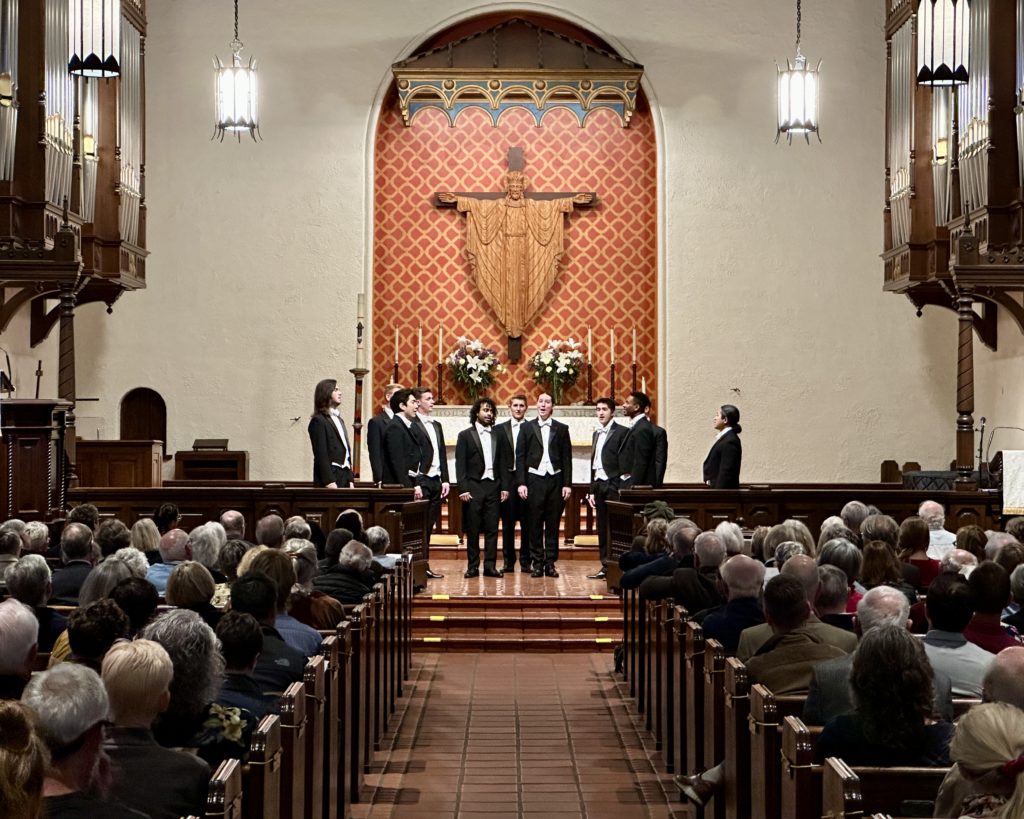Chanticleer: The Gold Standard of Choral Music Returns to St. James Music Series
Chanticleer, the consummate a cappella choral ensemble, made its annual visit to La Jolla’s St. James Music Series Sunday, and the sold-out house was unmistakable testimony to the audience’s high expectations.
Reviewing this eleven-member male vocal consort, however, is no easy task, since the combination of Chanticleer’s choral splendor and its exquisite programming exhaust the critic’s supply of superlatives one-third of the way through the program.True to the intentions of Chanticleer’s founders in 1978, the program opened with three Renaissance Latin motets performed with impeccable intonation and pristine clarity of text. Johannes Tinctoris’ concise Marian motet “Virgo, dei throno digna” offered undulating melismas that gently implore the Virgin Mary’s support of singers, an appropriate request to precede Josquin des Prez’s daunting setting of Psalm 114 “In exitu Israel.” After Des Prez’s breathless counterpoint, the mystic glow of tranquil chords presenting “Tu pauperum refugium” by an unknown composer provided another answered prayer.
Having saluted the Renaissance, Chanticleer quickly moved to a recent commission, the late Stephen Paulus’ “All Night” composed in 2011. The chant-like declamation of this motet’s fourth-century Chinese poetry (in English translation) was aptly supported by the singers’ warm yet deftly sonorous account of the composer’s pastel harmonies. A more musically challenging commission from 2019, “Strange how we can walk (in L.A.)” by the Chinese-American composer Zhou Tian framed this sly text by Seth Michelson with arresting vocal fanfares.
Composer Trevor Watson brought Robert Hayden’s unflinching poetic account of slavery’s toll, “Oh Daedalus, fly away home,” into acute focus with his stark, fearsome rhythms and unforgiving dissonant cadences. It was wisely placed to introduce Jonathan Woody’s “God’s gonna trouble,” a virile and unsettling arrangement of two familiar spirituals, “Follow the drinking gourd!” and “Wade in the Water.” The historical context of the Negro spiritual is too fraught to allow these songs to be received as mere entertainment, and Woody’s unflinching approach clearly exorcised superficial sentiment.
Pulitzer Prize winner Caroline Shaw’s “Her beacon-hand beckons” uses the symbol of the Statue of Liberty and fragments of Emma Lazarus’s immortal poetry to portray the heart-breaking longing of the “huddled masses yearning to breathe free.” Shaw’s deceptively simple musical style–parallel chords that suggest ancient organum—evokes that sacred bond of trust embedded in liberty’s vaunted promise, not to mention the profound responsibility of those who would offer refuge.
The trio of songs that opened Chanticleer’s second half at St. James revealed the psychological subtext that undergirds the ensemble’s programming. Shakespeare’s familiar poem “Blow, blow, thou winter wind” (from his play As You Like It) as set by George Walker, Harold Arlen’s “Stormy Weather” from the Great American Songbook, and Carole King’s evergreen ballad “Both Sides Now” may speak of weather—rain, clouds, and storms—but these are only metaphors for the vicissitudes of human experience, and Chanticleer’s searing performance of these songs unlocked their deep emotional subtext.
At intermission, folks may speak in glowing terms about Chanticleer’s technical artistry, but I believe it is the singers’ probing emotional communication that brings audiences back concert after concert and sets Chanticleer apart from other choral ensembles.
This concert was presented by the St. James Music Series at La Jolla’s St. James by-the-Sea Episcopal Church on Sunday, April 30, 2023.

Ken Herman, a classically trained pianist and organist, has covered music for the San Diego Union, the Los Angeles Times’ San Diego Edition, and for sandiego.com. He has won numerous awards, including first place for Live Performance and Opera Reviews in the 2017, the 2018, and the 2019 Excellence in Journalism Awards competition held by the San Diego Press Club. A Chicago native, he came to San Diego to pursue a graduate degree and stayed.Read more…


Yes, I agree – Chanticleer always has stunning technique and musicality — but I was most struck, in your review, by the depth offered by the composers they chose, and the many contemporary settings.